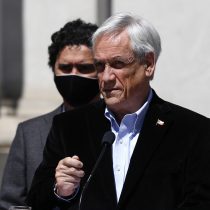
President Sebastián Piñera last night presented the main guidelines of the 2021 Budget, an era marked by the Covid-19 pandemic and with a strong focus on employment and economic revival, and the debate was immediately installed.
“I am under no illusion that this will be expeditious,” Said this morning the Minister-General of the Presidency (Segpres), Christian Monckeberg, one of the men who will be key to the coming parliamentary negotiation.
Since the opposition, they have already notified that they will look with a magnifying glass at the Executive proposal. Upon learning of the presidential announcement, Senator Jorge Pizarro (DC), holder of the Joint Budget Committee, he said that “executing the 2021 Budget – which means US$ 73.2 billion – will be the focus of opposition concerns, as economic recovery requires efficiency in the implementation of public investment – which this 2020 presents worrying delays in regions and public works reaching only 41% implementation by July.”
“Once again they are nice ads, let’s see how they get concrete in practice. Experience has taught us about small print. And for that we will see calmly how the implementation of the budget comes, what are the prioritized projects. In addition to how public investment and support for SMEs is coming, it looks very weak. There have been announcements that ultimately make no sense to people, because they don’t get them. I think the fundamental thing is to aim for better implementation of public spending, because so far the government has been very bad in that management,” he said.
For his part, his PPD colleague Ricardo Lagos Weber assured radio cooperative that it is time to “break the chanchito” in the face of the economic needs generated by the Covid-19 pandemic in the country.
The parliamentarian shared that the emphasis was “on employment and revival”, and commented that “the Budget is well directed from that point of view”. However, he warned that “I want to sit down and see a departure from the Budget that they are telling me, because they tell us one thing and then it is not so.”
Skeptically, the communist MP and chairman of the Finance Commission, Daniel Núñez, argued that President Piñera’s speech was “full of bombastic words and phrases for bronze,” but assured the treasury for next year will have a deficit to finance economic revival.
“We want to review very well whether methodologically the increase that he pointed out that he has the public spending of 9.5% and the public investment of 14% is real and is taken on the basis of the original budget that was approved this year and not the resulting budget after the various readequations and reallocations that were made,” he said.
Program evaluation
One of the points that the opposition will look at is the evaluation of government programmes, which Piñera spoke of on the national network as an announcement that there will be adjustments in this area.
“The monitoring that the government spoke of is insufficient and cannot be a judge and a party, so we will propose to create an External Program Evaluation Council as a counterparty,” Senator Pizarro said.
In the same line, after learning about the main focus of the 2021 Budget, the deputy and member of the Finance Commission José Miguel Ortiz (DC), noted that in the legislative debate “we will focus on a good implementation of public investment, especially in regions” and also advocated for progress in the creation of an External Council for Government Program Evaluations.
For Nunez, meanwhile, the Zero-Based Budget methodology and the evaluation of social programmes only mean a cut in social spending.
“Under a technocratic language of terms such as zero budget and evaluation of social programs lies a significant cut in social spending, something that is absolutely incomprehensible and which I will not tolerate, considering the situation and the constraint of the economic difficulties and the very very overwhelming situation that the Chilean middle class and workers are experiencing in the midst of this crisis” Remarked.
In this line, PPD’s head of bench Raúl Soto also added to the doubts and raised that “we will look at the Budget Act in a part-by-part detail to ensure that such targeting in some sectors does not imply a reduction or elimination of social programs, since the President himselfreported that 700 government programs will be reviewed. What we want is for the slacks to come out of certain privileges that are in the state but not from the social programs that are intended and that are intended to benefit the people of our country.”
In addition, another focus will be the transparency of the silvers. In fact, Pizarro warned of the absence of pro-transparency measures in implementation, “and this is very dangerous, because we are in election time.” “There are seven elections ahead where the government can abuse the use of these resources (…) The key is to have transparency, how those resources are used, how they are prioritized, and the opportunity at which they run.”
Focus on SMEs
Meanwhile, deputy of the Social Green Regionalist Federation, Alejandra Sepúlveda, called the Government’s budget proposal in terms of growth, but also economic revival “interesting.” However, he said that “there is still very much to the right in terms of focus on SMEs and direct transfers to families, so affected in this pandemic”
He added, “the other thing we miss is what happens with direct transfers to families. I believe that it is very important today to create flexible instruments that allow direct resources to families through this new budget of the nation. And unfortunately, we haven’t seen that edge of direct transfers that are very important at this time of pandemic, and which Minister Briones himself said were so important,” he concluded.
Similar is the view of the head of the PPD bench, who said that while it is positive to focus on economic revival and employment, it was missed that “no word was actually devoted to how the state will contribute to improving income for workers. We would have expected an announcement of strengthening the minimum guaranteed income, for example, which effectively allows for greater certainty and safety for the workers of our country.”
Mapuches, education, health and regions
But there are other edges, too. Mapuche MEP Emilia Nuyado (PS) said she did not understand “why one of the axes of the Budget is to strengthen the police force and to no longer consider resources for the return of land to indigenous peoples.”
The MP stated that “this Government is supposed to have dialogue with the Mapuche people and the general people with indigenous peoples, but there is no special measure in the budget for them.”
“On the other hand, we need the government to continue land restitution for Mapuche communities, it cannot remain stagnant, it is a demand that it cannot hide under the carpet and prefer to place more resources for police repression,” Emilia Nuyado said.
The Mapuche MEP said that “we find it contradictory that among the priority initiatives are investment plans in both policemen including the renovation of 390 police vans. In addition, more than $30,744 million is considered for infrastructure investment in police headquarters and our people are still waiting for their land to be returned.”
In the opinion of Mr PS Manuel Monsalve, meanwhile, the priorities in the 2021 Budget are three: health, education and economic revival.
“In Health, the question is from the experience of the pandemic whether the Government will propose a per capita increase for primary care as the country needs to address and protect Chileans’ health. The Government has applauded workers in the public health system, but I wonder if the Government’s 2021 budget will transfer workers who were in contract fees because at least this year it has not. I mean, he applauds them but keeps him in the job precariousness,” he said.
In his turn, Deputy Ortiz stated that what is relevant “is not the announcements but the execution in the territories, that support for SMEs, for female labour reintegration, that municipalities have more resources” will be improved.
That’s why the D.C. lawmaker aims to provide more support to CRUCH universities. “We need to look to the future, see how we’re going to recover: a more value-added economy requires more investment in innovation and universities, and that’s what we need to point to,” he said.
On the other hand, Mr Nunez regretted that the government did not rule in favour of the Super Wealth Tax – which drives communist banking – to generate higher tax revenues.
“There was a lack of pronouncement on the need to generate new tax revenue through the Super Wealth Tax, an initiative that is in Parliament and would have been a very good sign of austerity that the President of the Republic himself had pointed out that he supported this tax where he himself should make a greater contribution, as he is one of the great super-rich people benefiting from tax exemptions and Chile’s lower tax burden compared to other OECD countries,” Núñez stressed.





